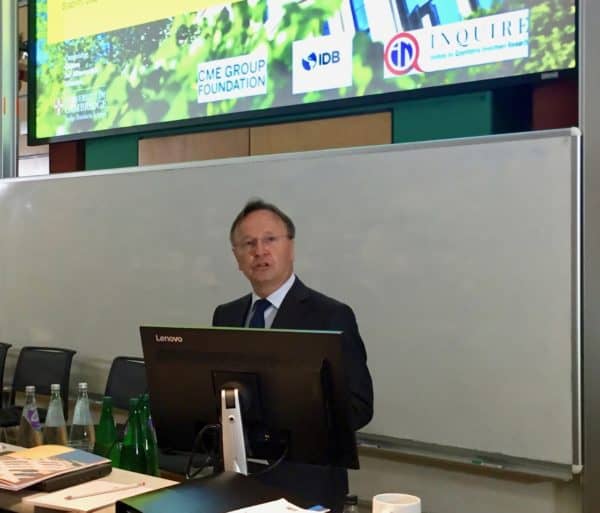
At the end of June, the Cambridge Centre for Alternative Finance (CCAF) hosted its second annual conference that saw participants from the world of finance from all over the world. The conference was entitled Navigating the Contours of Alternative Finance and sought to provide a snapshot of where innovations in finance stand today and where they are heading tomorrow. The CCAF has established itself as the leading researcher on the revolution occurring in the financial services sector today. The Centre’s ongoing reports that quantify, and qualify, the various markets around the world and specific regulatory nuances is invaluable to policymakers. The global impact of the online alternative finance industry which includes crowdfunding, peer-to-peer lending, cryptocurrencies, blockchain and other more exotic forms of alternative financing is vital for the future of the global economy. 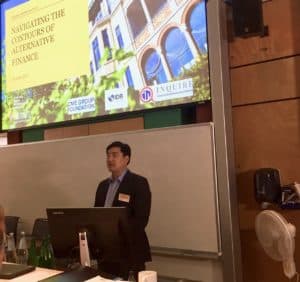
Co-founder and Interim CCAF Executive Director Bryan Zhang commented on the event;
“This year’s annual conference focused on the big pictures of the global alternative finance industry: its world-wide market development and underlying drivers, corporate adaptation of Fintech, the potential of leveraging financial innovation for financial inclusion in developing countries, as well as systemic regulatory and supervision risks and opportunities. We were not only trying to map out the landscape of global alternative finance collectively, but to make sense of its complexity, comprehend its fluidity and navigate its contours by furthering our understanding of this global phenomenon.”
The CCAF conference emphasized four specific themes centered on alternative finance:
- Market growth
- Corporate adaption
- Emerging markets
- Regulation
There were multiple panel discussions addressing these topics that included notable keynote speakers: Svein Andresen – Secretary General of the Financial Stability Board, Sarah Rapson – Director of Authorisation, Financial Conduct Authority, and Mario Marcel –Governor, Central Bank of Chile. Andresen from the FSB highlighted the regulatory implications of Fintech innovations: how it should be regulated and what the societal implications of new technologies in the alternative finance space might exist.
[clickToTweet tweet=”#Regtech is helping regulators better understand many of the fast-paced developments occurring in the #Fintech space” quote=”#Regtech is helping regulators better understand many of the fast-paced developments occurring in the #Fintech space”]
New financial players are, for the most part, still susceptible to similar macro and micro-economic shocks similar to institutional incumbents. Simultaneously, however, technological innovation is also occurring in the regulatory space. The usage of new regulatory technology or “Regtech” is helping regulators and governing bodies better understand and diagnose many of the fast-paced developments occurring in the Fintech space. 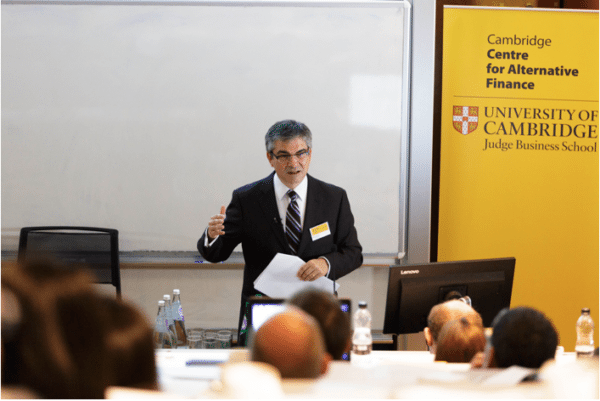
Marcel, the Governor of the Central Bank of Chile, noted that he does not see Fintech to be in conflict with central banking, its regulatory architecture, or its current financial stability mandates. Quite the contrary, Marcel sees opportunities in the efficiency of financial transactions through Blockchain or distributed ledger technology. The benefits of which could mean lower trade costs and more efficient channels for monetary policy.
The pace of Fintech innovation has left many recent developments comparatively unregulated. A good example is the emergence of initial coin offerings (ICOs) – a recent target of regulatory statements by the SEC (US) and MAS (Singapore). With a lack of data, experience, and market penetration, assessing risks for regulatory purposes is particularly complicated as governing bodies seek to ensure fair-play without stifling innovation that can benefit consumers.
As a result, most regulatory efforts have focused on crowdfunding and peer-to-peer lending, as it is amongst the most visible application of technology for alternative capital funding.
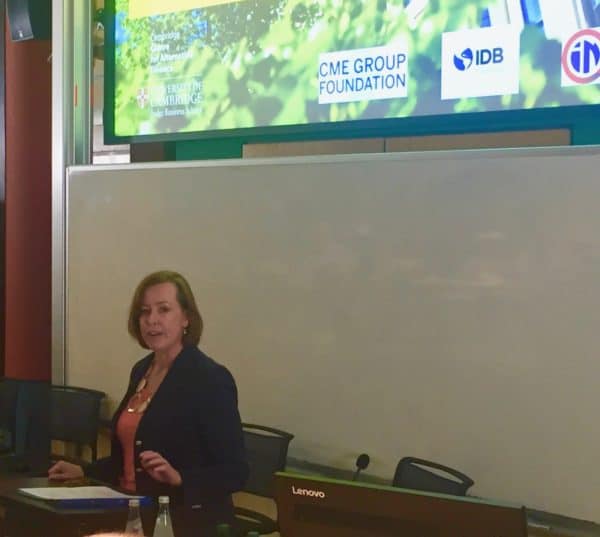
Even in the highest profile sectors of capital formation, regulatory authorities have to cope with a fast-evolving set of industry players and investors. Rapson, from the FCA, noted that firms under regulation have increased and diversified their activities due to swelling consumer demand and continual financial innovation. This, coupled with the global nature of alternative finance, has brought a need to better understand the associated regulatory risks and challenges. 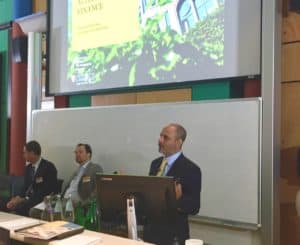
To better contextualize innovations in finance for regulators and industry players, Raghavendra Rau a Director at CCAF, Stijn Claessens (Bank for International Settlements), and Luigi Zingales (University of Chicago) engaged in a panel discussion on the current state of affairs globally in alternative finance and the importance of trust.
The largest markets can be found in the US, the UK and China. And while the success of China and the US can be explained by their relative size, that of the UK cannot be. Surprisingly, the data appears to reveal that it is the country specific variation of generalized trust (whether an individual trusts others in their own country), that can explain varying developments of alternative finance.
Another panel discussion turned its attention towards the corporate perspective of alternative finance. Representatives from the CME Group, Microsoft, IBM, the World Economic Forum, and BBVA were on-hand to discuss various topics including Blockchain’s effect on existing financial infrastructure, cryptocurrency, its implications for investment management, and the continued development of online channels.
Across the board, corporate incumbents believed these developments to be complementary rather than disruptive. Not surprisingly then, the group agreed that alternative finance probably won’t replace traditional finance instruments—but it will inevitably become an integral part of every modern technology focused organization. The global character of alternative finance was the theme of the third panel session on emerging markets and developing countries.
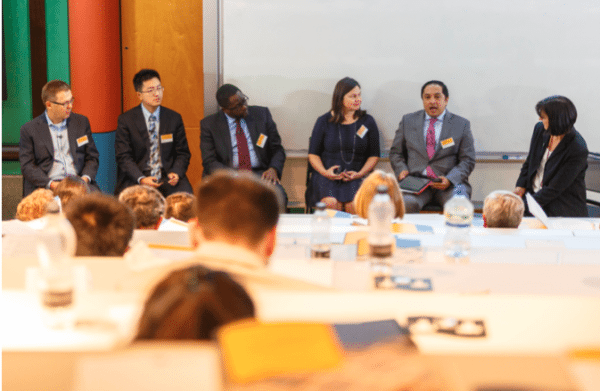
Representatives from the World Bank, the Inter-American Development bank, FSD Africa, Lend Academy and YingCanGroup discussed how to leverage financial innovation to promote financial inclusion via online alternative finance channels, the eradication of persistent poverty through digital leapfrogging, and the empowerment of women entrepreneurs and investors.
[clickToTweet tweet=”Providing sophisticated financial services to the underbanked is a compelling aspect of #Fintech” quote=”Providing sophisticated financial services to the underbanked is a compelling aspect of #Fintech”]
Alternative finance, panelists noted, has high potential to help fund development activities in emerging markets and help developing countries to prosper through technology-enabled new financing channels. Providing sophisticated financial services to the underbanked is a compelling aspect of innovations in finance.
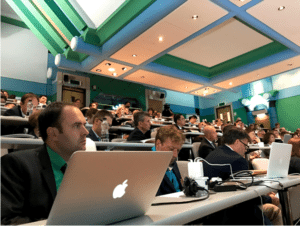 There was a final panel discussion on regulation was conducted under Chatham House Rules and chaired by a member of the Financial Stability Board’s Secretariat. Chatham House Rules mean it is an internal discussion and not for reference.
There was a final panel discussion on regulation was conducted under Chatham House Rules and chaired by a member of the Financial Stability Board’s Secretariat. Chatham House Rules mean it is an internal discussion and not for reference.
Regulators from the SEC, the Abu Dhabi Financial Services Regulatory Authority, the Malaysian Securities Commission and the European Securities and Market Authority (ESMA) discussed varied approaches in regulating alternative finance and how best to forge an evidence-based, appropriate and proportionate regulatory regime.
Regardless of background, industry, or affiliation, the theme of ‘trust’ recurred continuously throughout the conference. Trust, it seems, is at the heart of alternative finance, Fintech, and its regulation. For alternative finance to work, investors must trust that Fintech platforms are reputable, regulators need to ensure that they are secure, and technology needs to be transparent.
Blockchain, for example, is one way in which organizations are seeking to remedy issues of trust, as it can instantaneously validate transactions and remove opportunities for fraud.
[clickToTweet tweet=”The CCAF conference provided a valuable barometer for the #Fintech sector and its constituents” quote=”The CCAF conference provided a valuable barometer for the #Fintech sector and its constituents”] 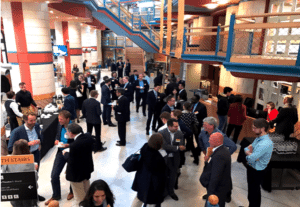
The CCAF conference provided a valuable barometer for the Fintech sector and its constituents. Corporates, investors, policymakers and regulators each play a unique role in the evolution of alternative finance. Elucidating new areas for study and refined methodologies are an inevitable outcome of the conference. The CCAF is expected to publish its much anticipated 2017 UK Alternative Finance Industry Report and its Global Blockchain Benchmarking Report shortly.
 Valentina Ausserladscheider is summer Research Associate at the Cambridge Centre for Alternative Finance. She is also a PhD student at the University of Cambridge.
Valentina Ausserladscheider is summer Research Associate at the Cambridge Centre for Alternative Finance. She is also a PhD student at the University of Cambridge.
CCAF will hold its 3rd Annual Conference in June 2018.
The conference programme is available below. [scribd id=355530155 key=key-OwEJqXQC36I3W8PBrWLu mode=scroll]

